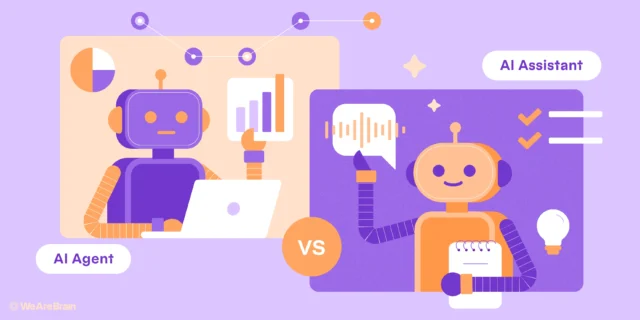
AI Assistants (Siri, Alexa): Reactive tools that execute single-step tasks when prompted by users. Best for personal productivity and routine tasks.
AI Agents (OpenAI Operator, Google Gemini): Autonomous systems that complete complex, multi-step tasks independently. Ideal for business automation and workflow management.
Key Differences:
- Autonomy: Agents work independently; assistants need prompts
- Complexity: Agents handle workflows; assistants manage simple tasks
- Learning: Agents adapt over time; assistants have limited learning
2025 Landscape: Major players launching autonomous agents with web navigation, project delegation, and cross-system integration capabilities via Model Context Protocol (MCP).
Bottom Line: Choose assistants for control and simplicity, agents for automation and scale. Understanding this distinction is crucial for leveraging AI effectively in 2025.
Picture this: it’s Monday morning, and while you’re having your coffee, an AI is already negotiating with suppliers, analysing market trends, and scheduling meetings based on your calendar availability. This is the reality of AI agents in 2025.
As AI continues to reshape how we work and live, two terms keep popping up: AI agents and AI assistants. While they might sound similar, understanding the difference between these technologies is crucial for businesses looking to stay competitive in today’s digital landscape.
Defining the concepts
AI assistants: Your reactive helpers
We’re all familiar with AI assistants. Whether it’s asking Siri about the weather, getting Alexa to play your favourite playlist, or using Google Assistant to set reminders, these reactive systems have become part of our daily routines. AI assistants excel at managing calendars, answering queries, and handling straightforward tasks – but here’s the catch: they need you to tell them what to do.
Think of AI assistants as highly efficient personal secretaries who wait for your instructions. They’re brilliant at executing single-step tasks but lack the autonomy to make decisions or tackle complex challenges independently. This dependence on user input, while ensuring control, can limit their effectiveness in more demanding scenarios.
AI agents: The proactive doers
AI agents are the autonomous problem-solvers of the AI world. Unlike their assistant counterparts, AI agents don’t just wait for commands; they actively work towards goals you’ve set, making decisions and executing multi-step tasks without constant human guidance.
Take OpenAI’s Operator, Google’s Gemini Agent Mode, or Manus AI as examples. These systems can handle complex workflows like researching and booking an entire business trip, analysing market data to execute trades, or even creating and optimising websites from scratch. The key difference? They figure out how to achieve your objectives rather than just following predefined instructions.
Key differences between AI agents and AI assistants
The distinction between agent vs assistant AI boils down to several critical factors:
Autonomy is perhaps the most significant differentiator. While assistants require user prompts for each action, agents operate independently once given an objective. Imagine the difference between manually instructing someone to check each flight option versus saying “book me the most cost-effective trip to Amsterdam next month” and having it done.
Functionality varies dramatically too. Assistants handle simple, single-step tasks brilliantly. Agents, however, thrive on complex, multi-step processes that require planning, decision-making, and adaptation.
When it comes to interaction, assistants primarily communicate with users, while agents can interact with multiple systems, APIs, and even other AI agents to accomplish their goals. This interconnectedness enables them to perform tasks that would be impossible for traditional assistants.
Learning and adaptation capabilities also set them apart. AI agents continuously learn from their interactions and outcomes, improving their performance over time. Assistants, while helpful, have limited learning capabilities and mostly rely on pre-programmed responses.
The use cases reflect these differences perfectly. Assistants shine in personal productivity scenarios: setting alarms, sending messages, or providing quick information. Agents excel in business process automation, complex research, and tasks requiring strategic thinking.
Recent developments in AI agents and assistants (2025)
The AI landscape in 2025 has seen remarkable developments. OpenAI’s Operator can now autonomously navigate websites, fill forms, and complete transactions – tasks that would have required human intervention just a year ago. It’s not just about automation; it’s about intelligent automation that understands context and intent.
Google’s Gemini Agent Mode represents another leap forward, allowing users to delegate entire projects rather than individual tasks. Need a comprehensive market analysis? Gemini can research, compile data, create visualisations, and even draft recommendations – all without step-by-step guidance.
Manus AI, developed by Monica, pushes boundaries even further. This fully autonomous AI agent can handle everything from creating complete websites to conducting sophisticated stock analyses, learning from each interaction to improve future performance.
Perhaps most significantly, the adoption of the Model Context Protocol (MCP) by major AI providers has enhanced interoperability between AI models and external tools, making agents more powerful and versatile than ever before.
Ethical and regulatory considerations
With great autonomy comes great responsibility. As AI agents operate with increasing independence, questions about accountability become more pressing. Who’s responsible when an autonomous agent makes a decision that leads to unexpected outcomes?
Data privacy presents another challenge. AI agents often need access to multiple systems and datasets to function effectively, raising concerns about how personal and business data is accessed, used, and protected.
The regulatory landscape is evolving rapidly in response. Governments worldwide are calling for stronger AI regulations to ensure these powerful tools are deployed safely and equitably, balancing innovation with protection.
Choosing between AI agents and AI assistants
So, when should you use an AI assistant versus an AI agent? The answer depends on your specific needs and comfort level with autonomous systems.
Use AI assistants when:
- You need help with routine, single-step tasks
- User control and predictability are paramount
- You’re dealing with sensitive information requiring human oversight
- Quick, straightforward responses are sufficient
Use AI agents when:
- You’re facing complex, multi-step processes
- Tasks require research, analysis, and decision-making
- You need to scale operations without proportionally increasing human resources
- Automation of entire workflows would significantly boost efficiency
Many organisations are adopting hybrid approaches, using assistants for user-facing interactions while deploying agents for backend processes and complex automation. This combination optimises both efficiency and user experience.
Future outlook
Looking ahead, we can expect increased integration of AI agents across industries. From healthcare systems using agents to manage patient care pathways to financial institutions deploying them for risk assessment and portfolio management, the applications are limitless.
Advancements in AI capabilities will lead to even more sophisticated agents and assistants. We’re moving towards a future where AI systems don’t just execute tasks but truly understand context, anticipate needs, and make nuanced decisions that enhance human capabilities rather than replace them.
Making the right choice for your business
Understanding the distinction between AI agents and AI assistants isn’t just academic – it’s essential for leveraging these technologies effectively. While assistants remain valuable for personal productivity and simple task management, agents represent the next frontier in business automation and intelligent decision-making.
As we navigate this evolving landscape, the key is to match the technology to your needs. Need a helpful companion for daily tasks? An AI assistant fits perfectly. Looking to transform complex business processes and scale operations? It’s time to explore AI agents.
The future isn’t about choosing one over the other – it’s about understanding how both can work together to create more efficient, productive, and innovative ways of working. And with the rapid developments we’re seeing in 2025, that future is already here.
